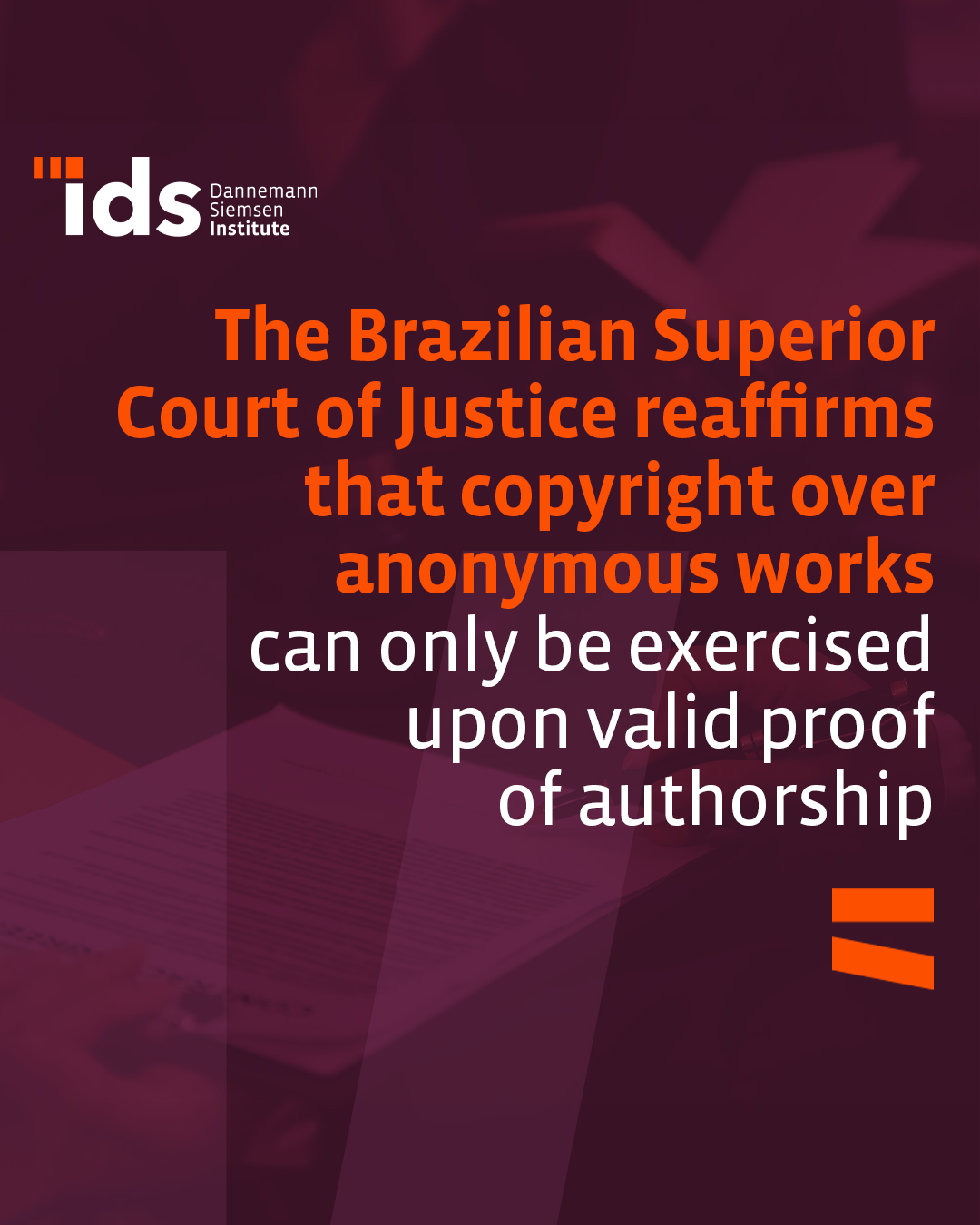04 de novembro de 2025
Share
The Brazilian Superior Court of Justice reaffirms that copyright over anonymous works can only be exercised upon valid proof of authorship
On August 20, 2025, the Third Panel of the Superior Court of Justice (STJ) unanimously held that anonymous works “will only be subject to legal protection after the formal recognition of their author”. The legal protection of anonymity and any rights over the anonymous work apply from the moment the author becomes known”. In adjudicating Special Appeal No. 2,196,790/DF, under the rapporteurship of Justice Ricardo Villas Bôas Cueva, the Court reaffirmed that, although copyright registration is not a prerequisite for statutory protection, the alleged author bears the burden of proving authorship through appropriate evidentiary means in order to seek redress for unauthorized uses.
The dispute arose from an action for damages filed by the plaintiff, who claimed to be the author of graphic compositions used on decorative items — including plaques, framed prints, and cushions — marketed by a retail company. The plaintiff asserted that the works consisted of stylized illustrations accompanied by the phrases “longe se vai quem acredita” (loosely, “one goes far who believes”) and “que a vida pode ser mais bonita” (loosely, “that life can be more beautiful”), originally created in digital format and disseminated without attribution. He sought judicial recognition of his authorship, public acknowledgment of attribution, and compensation for material and moral damages resulting from the alleged unauthorized reproduction.
The trial court upheld the claim, awarded damages, and ordered the retailer to acknowledge the plaintiff’s authorship. On appeal, however, the Court of Justice of the Federal District and Territories (Tribunal de Justiça do Distrito Federal e dos Territórios—TJDFT) reversed the decision, holding that the plaintiff had not sufficiently substantiated his assertion of authorship.
The appellate court found that both the phrases and the graphic style invoked by the plaintiff were already widely disseminated in similar commercial products across various platforms. The expression “Longe se vai quem acredita” was deemed commonly used and lacking in originality, individuality, or creative distinctiveness necessary to confer exclusive copyright protection. Accordingly, the TJDFT concluded that there was no valid proof that the plaintiff was the creator of the works and, consequently, it was not possible to recognize any infringement or compensation.
Upon review, the STJ affirmed the appellate ruling. The Third Panel held that, while copyright protection does not depend upon registration, and the absence of attribution does not imply renunciation or assignment of rights, the absence of identifying authorship imposes a heightened evidentiary burden upon the individual claiming authorship. In such cases, the work is treated as anonymous, and full protection is only realized once authorship is formally demonstrated. In the absence of such proof, no claim for damages or recognition of authorship may be sustained.
The Court further clarified the distinction among signed, pseudonymous, and anonymous works. Under the Copyright Act (Law No. 9.610/98), authorship may be indicated by civil name, initials, pseudonym, or any conventional sign. A pseudonymous work, therefore, is not considered anonymous, as it contains an identifying marker and is protected from the moment of disclosure. Anonymous works, however, lack attribution, and the exercise of full protection depends upon later identification of the author. In the present case, because the compositions were unsigned and authorship was not proven, the protection claimed could not be granted.
Finally, STJ declined to impose liability on the retailer. The Court applied the precedent established in Special Appeal No. 2,057,908/SC, authored by Justice Nancy Andrighi, which held that, where authorship is not ascertainable, the Copyright Act does not impose a duty of prior verification on entities engaged in commercial distribution. Accordingly, in the absence of any indication of authorship on the works themselves, no legal basis existed for imposing a duty of prior investigation upon the commercial seller.
The decision may be accessed at the following link: Special Appeal No. 2,196,790/DF.
Note: For quick release, this English version is provided by automated translation without human review.
